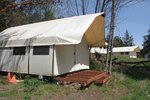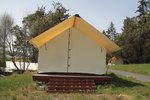Sleeping overnight in a moldy tent is nobody’s idea of glamorous.
That’s the dilemma now facing officials of the Fort Worden Public Development Authority.
With the PDA’s …
This item is available in full to subscribers.
We have recently launched a new and improved website. To continue reading, you will need to either log into your subscriber account, or purchase a new subscription.
If you had an active account on our previous website, then you have an account here. Simply reset your password to regain access to your account.
If you did not have an account on our previous website, but are a current print subscriber, click here to set up your website account.
Otherwise, click here to view your options for subscribing.
* Having trouble? Call our circulation department at 360-385-2900, or email our support.
Please log in to continue |
|


Sleeping overnight in a moldy tent is nobody’s idea of glamorous.
That’s the dilemma now facing officials of the Fort Worden Public Development Authority.
With the PDA’s “glamping” tents — short for “glamorous camping” — aging in place, sitting unfinished and exposed to the elements, the board unanimously voted to declare an “emergency” at its meeting last week in the hopes it can hire a contractor for $600,000 to complete the project.
Approximately $1.3 million has already been spent on the glamping project, according to David Timmons, executive director of the PDA. That estimate includes all designing, utility work, direct and indirect labor, and materials.
The declaration of an emergency will allow the PDA to hire a contractor without being subject to state law that requires competitive bids for public works projects.
“The requirements are pretty onerous,” Timmons told the PDA board during its meeting last week.
The glamping project has long been in the works. The PDA announced in 2018 a plan for
24 high-end camping tents, with hopes to have 20 tents available for visitors in 2019.
Installation of water, electrical, and other improvements started in 2019, and the PDA had hoped to complete the project in phases, with 15 bathroom-equipped tents ready for campers in June 2020.
The COVID-19 pandemic ultimately shut down additional work on the project, however.
Temporarily abandoned, in the words of the PDA’s attorneys, who noted in an April 22 memo to Timmons that the authority had borrowed money with an obligation to complete the project and that revenue from campers was supposed to be used to repay the loan.
The materials purchased to complete the project are now in storage, wrote attorney Brian C. Augenthaler of the Seattle law firm Keating, Bucklin & McCormack in the memo.
“The materials purchased by the PDA are aging in a warehouse,” Augenthaler wrote. “Those tents that have been erected are without heat, creating a strong possibility of mold development in these expensive structures, which could result in the waste of public funds.”
Visitors to Fort Worden can easily see the glamping tents unfinished in place on one end of the campus of the park, many with unfinished decks and lacking internal amenities, sitting amid scattered orange safety cones and tall weeds.
PDA officials discovered in late 2020 that funding that originally was expected to pay for work on glamping, as well as other capital projects at the fort, had been diverted to pay for the day-to-day operations of the PDA.
Meanwhile, work on the glamping project had been halted because it couldn’t continue due to the pandemic shutdown.
“The staff that previously were engaged to do that were all terminated and let go as a result of the pandemic,” Timmons told board members last week.
“Now you have a project that is sitting there incomplete, much of the material to complete the projects like the flooring and finish work and lumber has already been purchased and in warehouses on campus.”
There was a reason the tents were put up despite the unfinished work on the project, he added.
“The tents were erected to try to preserve the platforms that got constructed,” he said.
Putting together a bid package to have the project finished is problematic, he added, because the PDA already has the materials needed in storage.
The PDA, Timmons said, is in an “odd situation of where we really don’t know how to put together a bid package.
“And if we did put it together, we’re talking probably several months just to get the bid package figured out. Then going out to bid to see if there were contractors who would give us a bid on something like this,” Timmons said.
Timmons recalled a similar situation when he was Port Townsend’s city manager and the city sought bids to have the skate park built.
The city tried three times to competitively bid the project without success.
“My fear is that’s going to be the same with glamping,” he told the board.
Timmons said he hoped to reach a contract agreement with Clark Construction on a “time and material basis” based on the project’s budget.
That could be done, according to the PDA’s attorneys, if an emergency was declared so the PDA would not need to competitively bid the project.
Additional funding would also be needed to have the project managed.
“I’m also looking at bringing in some extra help for project management,” Timmons said, adding he would seek the PDA board’s authorization at an upcoming meeting.
Through an earlier loan, the PDA has $600,000 available to spend to complete the project.
“Most of the work is going to be the flooring, the finishes, finishing the electrical and the plumbing installation,” Timmons said. “But beyond that, there’s not much else we need to do.”
A second phase of the project will remain, however. That includes the construction of a commons building, a kitchen and other bathroom facilities.
Timmons said that phase would be “shelved for now.”
Shannon Ragonesi, an attorney with Keating, Bucklin & McCormack, said the status of the project would qualify as an emergency.
“There’s a real urgent need to shore things up and keep things moving,” Ragonesi told the board.
Members of the PDA board expressed some skepticism that the project could actually be finished for $600,000.
Questions arose about the life cycle of the glamping tents, and how soon they could be ready for rentals.
Timmons said the tents have a useful life of 10 to
15 years, and he noted that the cost of the tents amounted to less than
10 percent of the total cost of the glamping project.
He also added there had been talk of eventually replacing the tents with small, Quonset-hut style buildings.
“Sort of like in the old military days,” Timmons said.
“We have talked about looking at some other type of replacement model when that time comes, that’s more durable and permanent,” he said.
The $600,000 in funding would be used primarily for carpenters, electricians, and plumbers.
The PDA had plans to put furniture in the glamping tents, but not anymore, Timmons said.
“The original project incorporated funding for the furnishings, as well,” he said. “But that’s not going to happen, though. We just don’t have those funds available.”
Site work, including landscaping, is also needed.
“I’m looking to do that as as separate contract,” Timmons told the board.
The PDA will have to maintain tight budget controls, he said, and that was why extra project oversight was needed.
“Right now time is of the essence,” Timmons said. “We need to get these online as soon as possible.”
PDA Board Member Celeste Tell doubted that $600,000 would be enough, and guesstimated the figure might be $900,000.
“You’re not far off. In the context of it, we don’t know,” Timmons replied.
Each glamping tent will need to be examined to determine the amount of work needed.
“Each one is going to have to be individually assessed because each one had its own exposure period [to the elements],” Timmons said.
“I know that the first tent that had the flooring finished — the flooring appears it was not installed correctly. So that’s going to have to be reinstalled,” he continued. “Each one’s going to have to be looked at.”
Concerns from the board continued.
“I have a little PTSD about DIY projects, that then contractors come in and go, ‘Yeah, well this wasn’t...’” Tell said.
“And more has to be redone than anybody ever thought,” she said.
Timmons recalled that the first competitive bid on the project centered on installing utilities.
The following bids for completing the project were beyond the PDA’s budget.
That led to work being done by PDA workers to put up the tents.
“They were brought in-house and done with in-house labor,” Timmons recalled. “And they purchased a lot of tools and a lot of things and supplies and materials to try to build it in-house.
“I think that that probably wasn’t the best approach to this,” Timmons said, adding that the pandemic then “really torpedoed” the glamping project.
“It is what it is,” he said.
The PDA would do its best to bring the project in with the $600,000 available, Timmons said. “But I can’t guarantee it.”
“Because I don’t know what we’re going to find when we get done with it.”
“But the point is: It’s got to get finished. It’s got to get done. We can’t walk away from it because we have the bond obligations to complete it,” he said.
Questions also remain on whether revenues from campers will be able to cover the debt on the project.
An earlier analysis by the PDA said camping fees would be sufficient to cover the debt over a 10-year period.
“There’s been some question about that study, as to whether how accurate it was,” Timmons told the board.
Even so, the debt must be retired and the PDA must show its lender it is trying to complete the project.
“If we didn’t have that obligation we could simply just write it off and start it over as some other future point,” Timmons said of the glamping project.
“We’ve got to finish what we started in that context,” he said.
After an extended discussion, the board agreed to declare an emergency but stopped short of authorizing Timmons to execute a contract to have the project finished.
Instead, he was asked to bring a plan back to the board for approval.
Skepticism remained.
“I don’t think we are going to get this done for $600,000,” said PDA Board Member Rodger Schmitt.
“We should be prepared to find a source to pick up the difference if we’re really going to go forward with this,” he said.
PDA Board Chair David King had a sunnier outlook.
“I’m choosing to be optimistic. I’ve been walking past these mothballed areas for some time now since the pandemic hit,” he said.
“I believe that these will be popular, as well, because of the kind of experience they will offer to visitors that has not been available to visitors at this park before,” King said.
“I’ve chosen to be hopeful,” he added.